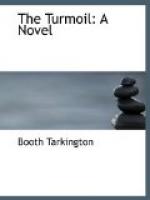His cheerfulness was vaguely diminished by the troublous state of affairs of his family. He had recognized his condition when he wrote, “Who would wake from such a dream as this?” Bibbs was a sympathetic person, easily touched, but he was indeed living in a dream, and all things outside of it were veiled and remote—for that is the way of youth in a dream. And Bibbs, who had never before been of any age, either old or young, had come to his youth at last.
He went whistling from the house before even his father had come down-stairs. There was a fog outdoors, saturated with a fine powder of soot, and though Bibbs noticed absently the dim shape of an automobile at the curb before Roscoe’s house, he did not recognize it as Dr. Gurney’s, but went cheerily on his way through the dingy mist. And when he was once more installed beside his faithful zinc-eater he whistled and sang to it, as other workmen did to their own machines sometimes, when things went well. His comrades in the shop glanced at him amusedly now and then. They liked him, and he ate his lunch at noon with a group of Socialists who approved of his ideas and talked of electing him to their association.
The short days of the year had come, and it was dark before the whistles blew. When the signal came, Bibbs went to the office, where he divested himself of his overalls—his single divergence from the routine of his fellow-workmen—and after that he used soap and water copiously. This was his transformation scene: he passed into the office a rather frail young working-man noticeably begrimed, and passed out of it to the pavement a cheerfully pre-occupied sample of gentry, fastidious to the point of elegance.
The sidewalk was crowded with the bearers of dinner-pails, men and boys and women and girls from the work-rooms that closed at five. Many hurried and some loitered; they went both east and west, jostling one another, and Bibbs, turning his face homeward, was forced to go slowly.
Coming toward him, as slowly, through the crowd, a tall girl caught sight of his long, thin figure and stood still until he had almost passed her, for in the thick crowd and the thicker gloom he did not recognize her, though his shoulder actually touched hers. He would have gone by, but she laughed delightedly; and he stopped short, startled. Two boys, one chasing the other, swept between them, and Bibbs stood still, peering about him in deep perplexity. She leaned toward him.
“I knew you!” she said.
“Good heavens!” cried Bibbs. “I thought it was your voice coming out of a star!”
“There’s only smoke overhead,” said Mary, and laughed again. “There aren’t any stars.”
“Oh yes, there were—when you laughed!”
She took his arm, and they went on. “I’ve come to walk home with you, Bibbs. I wanted to.”
“But were you here in the—”
“In the dark? Yes! Waiting? Yes!”




